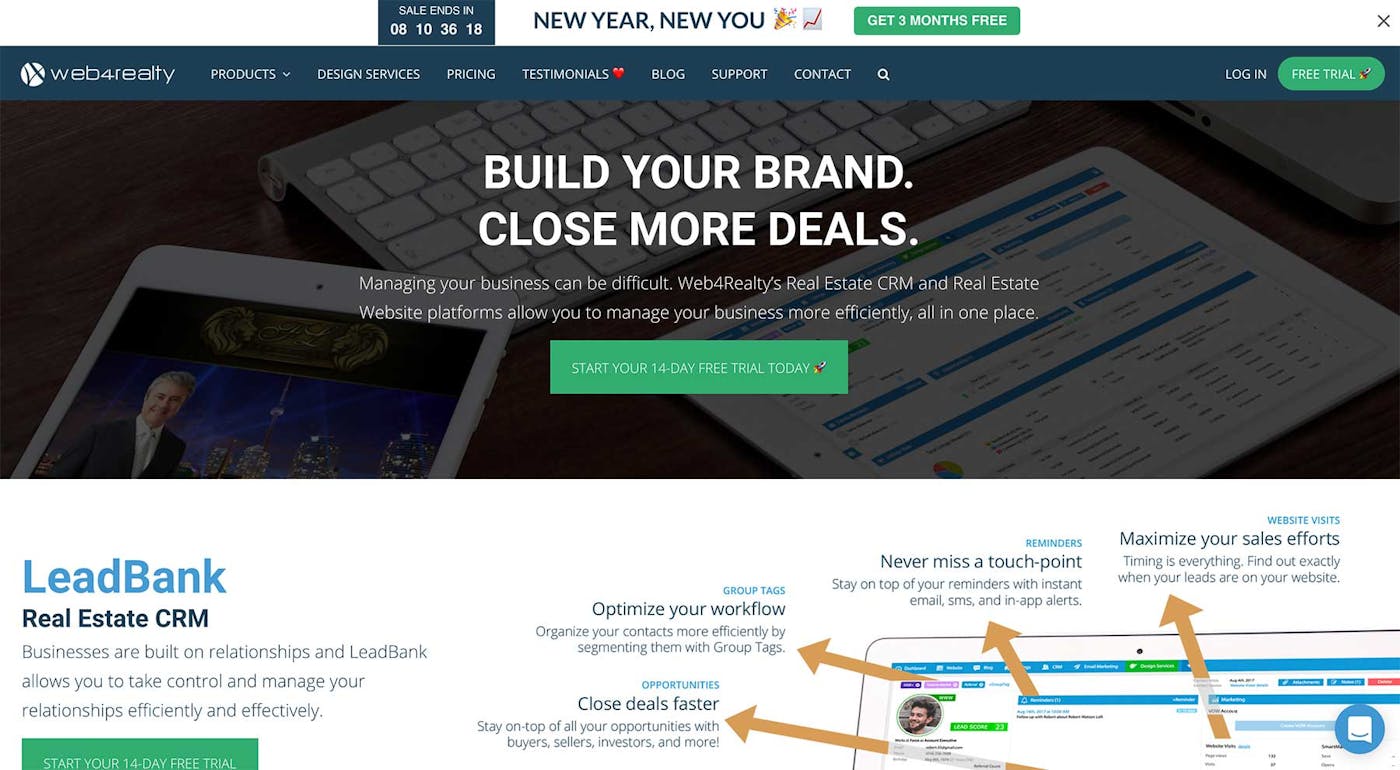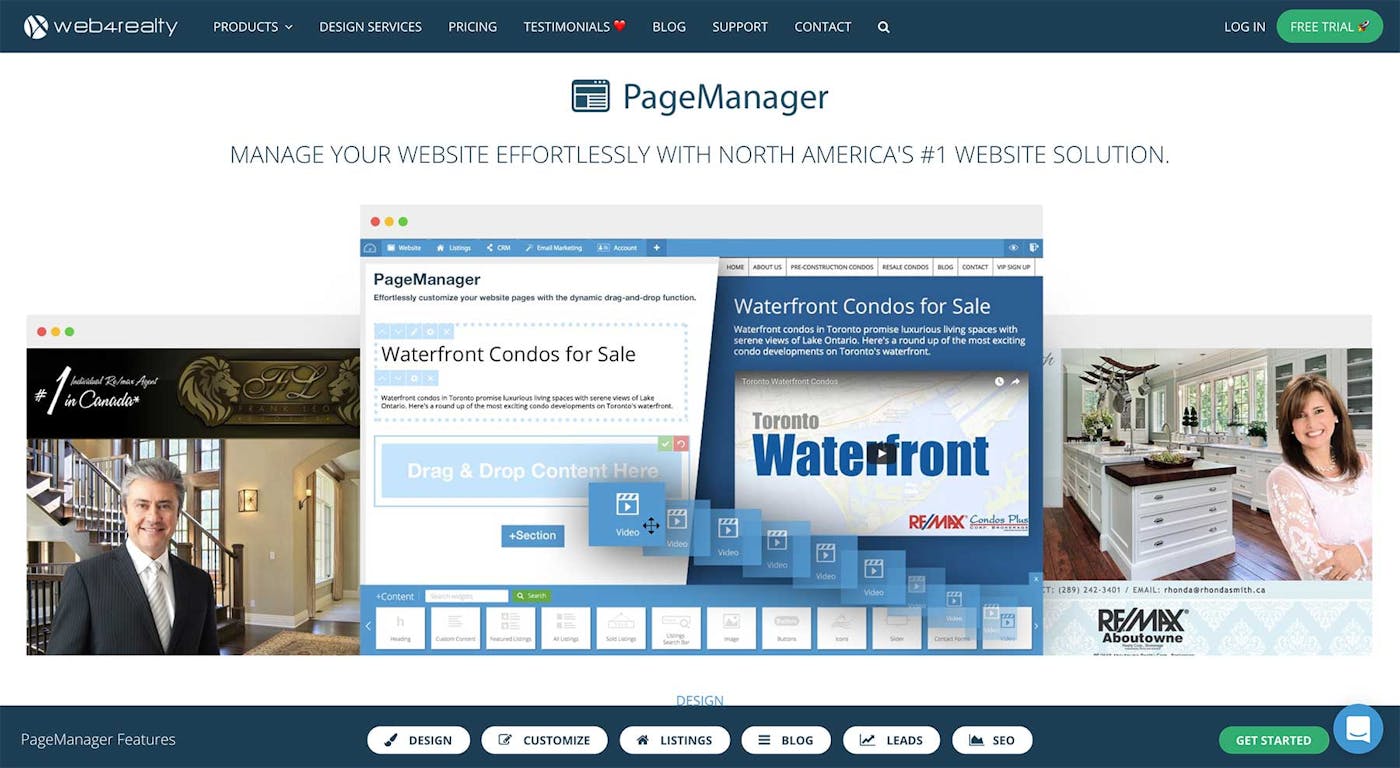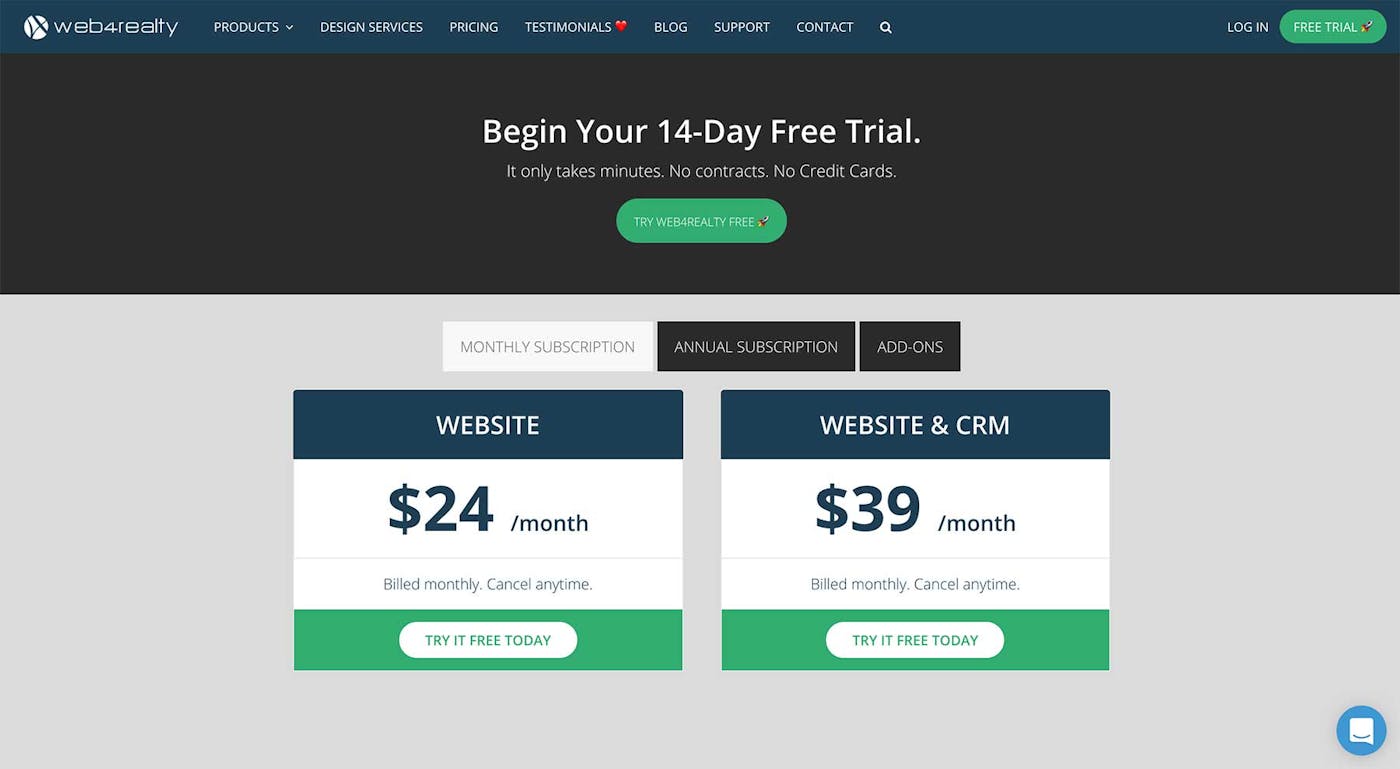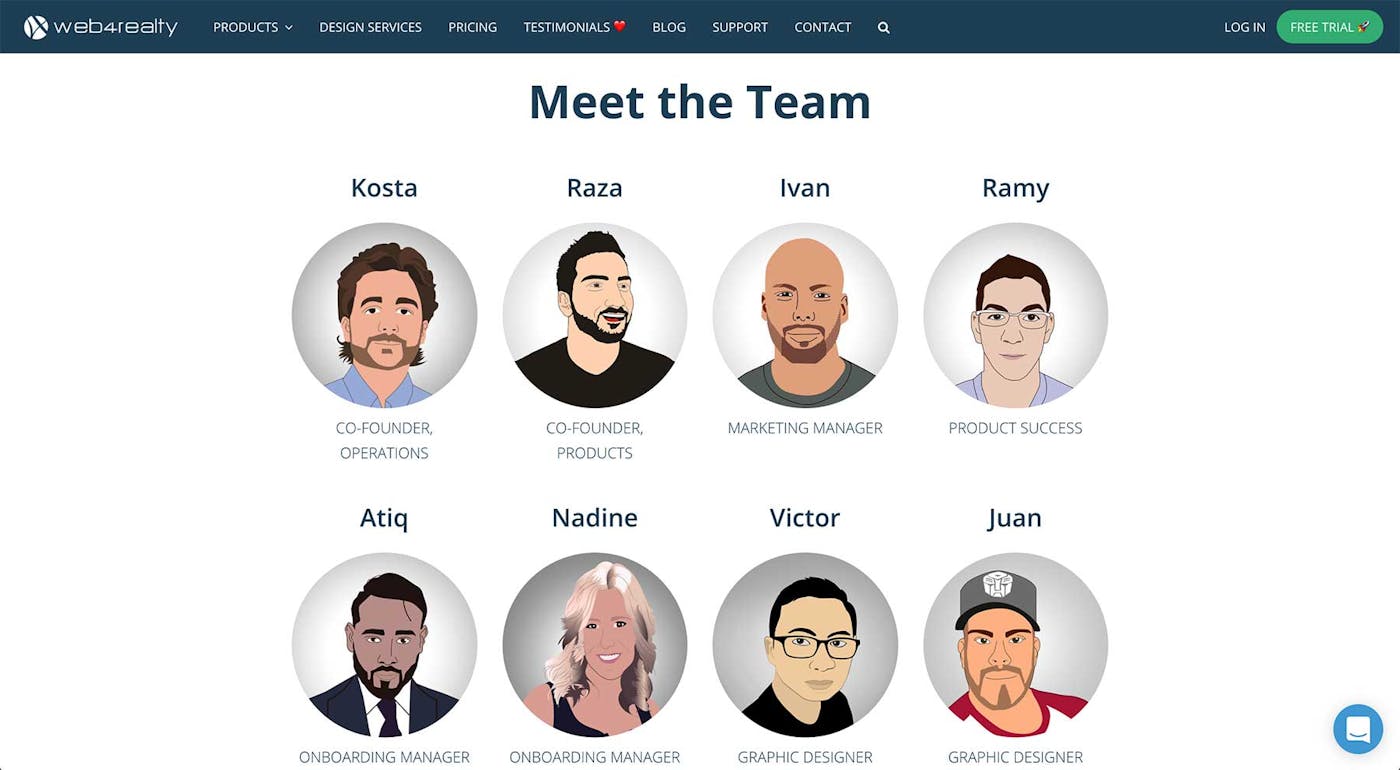Growing a Web Marketing Tool for Real Estate Agents to
$100k/mo
Hello! What's your background, and what are you working on?
My name is Kosta Panagoulias, and I'm a co-founder at Web4Realty — a SaaS that provides web marketing solutions to real estate agents. We provide a suite of marketing tools that real estate agents use to manage and grow their business. Our core products include a website builder, a CRM system, and an email marketing platform.
We're a fully bootstrapped company. We've grown from two founders out of my parent's basement, into a team of 14 full-time team members across six countries, and we've got thousands of paying clients. Our entire team is fully remote and distributed with no physical office location.
I have a Bachelor of Commerce degree from Ryerson University in accounting. I'm not a programmer or a developer, and I don't have any real "tech" experience. I've never even had a real corporate job. I would consider myself an entrepreneur and business-person, first and foremost, who just happened to fall into the software world!

What motivated you to get started with Web4Realty?
Around my second year of university, I really began to feel the itch to do something on my own. Raza (my co-founder) and I would meet up every Friday night and think of ways to make a million dollars — literally. We'd try to come up with business ideas or think of a way a million people would pay us a dollar each. What broke kid doesn't want to become a millionaire?!
Our very first internet venture spawned off from a website you might remember, called The Million Dollar Homepage. If you're unfamiliar with it, a student from England created a website with a million pixels arranged in a 1,000 x 1,000 pixel grid. The image based links were sold for $1 per pixel (10 x 10 blocks). The purchasers of these blocks provided images where they would put their logo/slogan, and a URL to link the image. The creator of The Million Dollar Homepage was successful in selling out the grid, and grossed $1 million! After that, thousands of clone pixel grid websites launched, none of which ever sold out.
Our idea was to create a similar grid, with a twist. We struck a deal with TIME Magazine, where we would get a two-page spread in the 2009 Person of the Year issue, which would advertise our pixel grid. Basically, the value we were providing to purchasers was that not only will they get space on the grid on our website, but their logo/slogan would also be included on our two-page spread in TIME Magazine. Our deal with TIME was dependent on whether or not we sold out the grid or not.
As you might imagine, our grid did not sell out (not even close), but we did manage to get a few big brands on board, including H&M, GAP, and a few big online companies. I still think it was a pretty decent idea, but we just failed miserably on execution.
Shortly after our failed pixel website, Raza got his real estate license, and teamed up with a successful realtor in our area. He then wanted to set up a real estate website for himself, so he started going through several providers. He found that all of these providers were overpriced, outdated, and didn't really see the value in spending that kind of money for a site.
One Friday night, during one of our "million dollar meetings", Raza brought up his experience with these real estate website providers. We then realized there was an opportunity to offer a better product, for a lesser price than the competition. That was our "aha" moment, and from that point on we got started on Web4Realty.
What went into building the initial product?
Neither of us had any tech experience, let alone software experience, so everything was foreign to us. We spent the first couple of months doing hundreds of hours of research on the business and industry. That mostly included going through competitors across Canada and the US with a fine-tooth comb, understanding what each company was offering, terminology, pricing models, etc.
I must have called a few dozen competitors, pretending to be a real estate agent, trying to learn as much as I could about each company, including how many users they had, how much staff they had, how long they've been in business, their onboarding process, sales processes, and any other pieces of information I could squeeze out, including some revenue numbers. You'd be surprised at what you might learn if you simply ask!
After learning as much as we could, we were finally ready to start development. Our first task was to hire a developer. We didn't have the money to hire a local developer, so we naturally decided to look overseas. We decided to start our search in Pakistan, since Raza is of Pakistani descent and can speak the language. We literally Googled "php developer in Pakistan" and found our first hire to start developing the software, who is still with us today.
During this time, I had just graduated and had a few thousand dollars saved up, which I used for development. I was also making a bit of money running a few blogs, and creating WordPress sites for small companies. Raza was working full time and had a steady income which also helped with funding development. After about 1.5 years, we finally had an MVP that was ready to hit the market. It was very basic and glitchy, but we were finally in business.

How have you attracted users and grown Web4Realty?
The Hustling Beginning
Since we bootstrapped from day one, we had to be very scrappy with our resources. We essentially gained our first several hundred clients with spending $0 on sales and marketing, and through straight hustling and grinding.
We're very lucky to be in an industry where gathering lead information is very easy. Fortunately for us, real estate agents plaster their emails and phone numbers all over the place, which is very convenient. Raza and I spent the first several months cold-calling leads, continuously collecting more email addresses and numbers, and sending individual marketing emails, one by one.
At the time, we were working out of my parents' basement, and sometimes leads wanted to meet with us in person, and of course we didn't want to decline a meeting. So there were times I drove across the city to meet a client just to close a $20 account. There were other times where we used a family member's office as our own to meet a potential client. The hustle was definitely real. We were managing our sales process on Excel — remember, we went all-in completely blind, learning as we went along. We operated this way for a good 5-6 months, and grinded our way to about 200-300 paying users.
Introducing Efficiency
With our first few hundred paying clients under our belt, and some revenue coming in, we continued to learn the industry, gain more knowledge, and naturally, our "hustling" phase started to mature a bit. Instead of using Excel to manage our clients and leads, we finally upgraded and invested some money to start using Salesforce. What is so basic, was actually a big move for us at the time. It proved to be critical in so many different ways, as it gave us a sense of structure and stability, and provided us an opportunity to scale, which we didn't realize at the time, but was a very important stepping stone.
We were still using Gmail to send out our marketing emails, but we started using an app to go along with Gmail called Toutapp, to track who was opening and clicking the emails we were sending. So instead of calling leads at random, we were now able to know who was a hot and cold lead through the engagement with our emails. This managed to increase our level of sales efficiency which allowed us to speed up our growth quite drastically. This little spurt of growth allowed us to hire our first sales rep and eventually just start compounding our growth.
Marketing Automation
About two years in, we had about 1,000 paying clients under our belt. This was about the time we turned into a real business with some traction. Our team was growing, we were making money and profitable. Email marketing was by far the best way to attract new business and get sales, at least to our target market, so we decided to invest heavily in that area. We setup a marketing automation funnel which would essentially nurture leads and do most of the selling for us. Putting together the marketing automation flow took quite a bit of learning, strategy and testing in order to optimize it to its full capacity.
With marketing automation in full swing, our sales reps were strictly "warm-calling", instead of cold-calling. We were only reaching out to leads who knew about our product, and engaging with our emails. We were equipped with so much information about the lead before we even called them, it made selling much easier, and our sales quotas quickly increased and new users just started to snowball because of that. Also, because those leads were getting nurtured automatically over time, it started bringing in significantly more inbound sales.
Scaling into a True SaaS
Currently, nearly all of our leads come from free trial signups through our website. Although we still do a lot of email nurturing, our big focus has been on content marketing. We regularly publish very useful content on our company blog that ranks very well on search engines. This drives hundreds of trial signups per month. We're able to convert nearly 60% of these signups into paid users.
Also, we've spent almost nothing on paid marketing channels, so there's huge opportunity and potential there as well that we plan on exploring.
Our current sales process and further improvements to our internal structure have given us the framework to scale into new markets very efficiently.

What are your goals for the future?
Our long-term goal is to have a footprint in every significant real estate market in Canada and the US. Recently, we've invested a lot of time and resources into our internal processes that will give us the platform to scale efficiently.
We've carved out a very significant share of the market in Toronto, which is one of the biggest real estate markets in Canada and the US. By the end of 2018, we want to be fully integrated into at least three major markets and replicate our success in Toronto.
What are the biggest challenges you've faced and obstacles you've overcome?
Thinking Bigger
After 4-5 years of working and operating in a particular way, we came to a crossroads in our business journey. On one hand, we would continue doing what we were doing, growing at a steady rate, and being very comfortable. After all, we were making money, profitable, and living a great lifestyle. On the other hand, if we wanted to become leaders in our space, not only in our local market, but leaders in Canada and the US, we had to think bigger. We had to fully revamp our methodology, our way of thinking, and of course our sales and marketing process. We chose the latter.
These new lofty ambitions required some pretty drastic changes to implement, not only from a business structural standpoint, but from a mindset standpoint as well. It took us a good 6-8 months to figure out and implement this new way of working. Every department had to be altered in order to be aligned with the way things were heading, and with scalability in mind.
One of the most challenging aspects was to get our team, who was so used to working in a particular way, to change their mindset, and get them aligned with the new company vision. Luckily for us, we have the most talented and dedicated team in the world!
Going Remote
Another recent challenge we overcame was taking our company fully remote. For the past several years, we've invested a great deal of time in improving our internal efficiencies and processes, trying out and testing dozens of different tools and applications to help make our lives easier. Without knowing it, all these improvements within our organization over the years is what paved the way for us to be a 100% distributed team.
Unfortunately, not all people are able to handle remote work effectively. It requires certain attributes like being self-disciplined and self-motivated. We had to make a few alterations to our team because of that, but it all worked out for the better. After two years of working remote, we've seen an increase in productivity, more freedom to think outside the box and get creative, more transparency, and of course, several lifestyle advantages.
Hiring
One of the biggest challenges in managing a growing company is hiring new employees. Something I learned that is very important is that hiring is a true skill that gets better with experience. The hiring and onboarding process should be taken very seriously and is something you should not half-ass. This is especially true for a bootstrapped company which can't afford to invest time, money, resources, and training into a new employee that won't work out. A failed hire can cause a lot of financial strain on a self-funded startup that doesn't have cash to burn to start the hiring process over again.
Have you found anything particularly helpful or advantageous?
I believe there are certain human characteristics that give some entrepreneurs the advantage over others — work ethic and persistence. Those two traits will compensate for absolutely any skillset that may be lacking. Without those characteristics, we wouldn't have lasted nearly this long in a business and industry that was so new and foreign to us.
Coming from a financial background, I think it's imperative for at least one founder to have a deep understanding of your company's books and finances. This is a crucial component to ensuring your company remains stable and profitable.
It's important to never stop learning and educating yourself, especially from other founders who are proven and successful in your industry. I'm constantly absorbing as much information as I can from peers and industry leaders in the industry, through podcasts, Twitter, blogs, and sites like Indie Hackers. There is so much openness and transparency that other founders share, which is amazing. That's one of the reasons why I think it's important for me to share my experiences and also give back to the startup ecosystem.
What's your advice for indie hackers who are just starting out?
I don't believe in Plan B's. Many people disagree with me on this, but I believe that if you're planning for failure, then you're almost destined to fail. There's no need to instill a grain of doubt in your mind. Believe in what you're doing and don't stop until you get it. No Plan B's!
My business mantra is "Ready, FIRE, Aim", rather than the traditional "Ready, Aim, FIRE". I meet a lot of aspiring entrepreneurs that get too caught up in the business planning, pro formas, and logistics, when they should be getting out there and speaking with customers, and just simply putting the wheels in motion.
Although planning is certainly important, I also believe it could be impractical at the same time. In a startup, plans are constantly changing week-to-week, or even day-to-day. Too many people do too much planning too early on and feel they need elaborate business plans, only to see those "plans" blow up in their faces.
A mentor once suggested the "One-Page Strategic Plan", from Mastering the Rockefeller Habits. If you need to plan, that one-pager is all you need.

Where can we go to learn more?
Company website: web4realty.com
Personal website: founderviews.com
Twitter: @kostapana
Feel free to ask me any questions in the comments below, or hit me up on Twitter!
